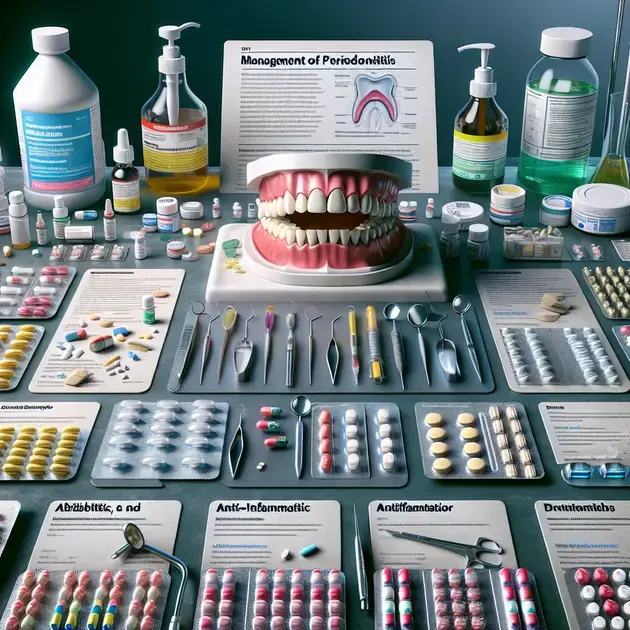Struggling with periodontitis and looking for effective medication options? You’ve come to the right place. In this comprehensive guide, we’ll explore the latest and most effective treatments for periodontitis.
Periodontitis, a serious gum infection that damages the soft tissue and destroys the bone that supports your teeth, can lead to tooth loss if left untreated. It’s crucial to find the right medication to manage and treat this condition effectively. Let’s delve into the different options available and how they can help combat periodontitis.

Finding the Best Medication for Periodontitis
When searching for the best medication for periodontitis, it is important to consult with a dental professional to assess the severity of your condition and determine the most suitable treatment plan. One common medication prescribed for periodontitis is an antimicrobial mouth rinse containing chlorhexidine. This rinse helps to reduce bacteria and inflammation in the gums, promoting healing.
Another medication that may be recommended is an antibiotic, such as doxycycline, which can be taken orally to control bacterial growth in the mouth. It is important to follow the dosage instructions provided by your dentist or healthcare provider when using these medications to ensure effectiveness and minimize side effects.
To find the best medication for your specific case of periodontitis, consider researching reputable dental websites such as the American Dental Association (ADA) or consulting with online platforms like Healthline. These sources provide valuable information on different medications, their potential side effects, and how they can help treat periodontal disease.
Additionally, discussing your options with a periodontist or dental specialist can help you determine the most effective medication based on your individual needs and goals for improving gum health. By taking proactive steps to find the best medication for periodontitis, you can work towards restoring your oral health and preventing further complications.
Remember to always prioritize your oral hygiene routine by brushing twice a day, flossing daily, and scheduling regular dental check-ups to maintain the health of your gums and teeth.
Understanding the Impact of Periodontitis Medication
Periodontitis medication plays a crucial role in managing the symptoms and progression of gum disease. Understanding the impact of these medications involves recognizing how they work to combat bacterial infection and inflammation in the gums, ultimately promoting healing and preventing further damage.
One common type of medication used to treat periodontitis is a prescription-strength antimicrobial mouthwash, such as Peridex. This mouthwash helps to reduce bacteria in the mouth, control plaque buildup, and soothe gum irritation. By incorporating this medication into your daily oral care routine, you can effectively manage the symptoms of periodontitis and support the health of your gums.
Another medication often prescribed for periodontitis is a subantimicrobial dose of doxycycline, such as Periostat. This medication works by inhibiting enzymes that break down collagen in the gums, helping to reduce inflammation and prevent further damage to the periodontal tissues.
By understanding the impact of periodontitis medication, patients can make informed decisions about their treatment plan and take proactive steps to improve their oral health. Consulting with a dental professional or periodontist can provide valuable insights into the benefits of these medications and how they can contribute to the overall management of periodontal disease.
It is essential to follow the recommended dosage and usage instructions for any medication prescribed for periodontitis to ensure optimal results and minimize potential side effects. Regularly monitoring the effects of the medication with your dental provider can help track progress and make any necessary adjustments to your treatment plan.
Maximizing the Effectiveness of Periodontitis Treatments
Maximizing the effectiveness of periodontitis treatments involves a comprehensive approach that includes both professional interventions and at-home care strategies. One key step in optimizing treatment outcomes is to follow a personalized oral hygiene routine recommended by your dentist, which may include using specialized dental tools and products to clean your teeth and gums thoroughly.
During professional dental cleanings, your hygienist can remove plaque and tartar buildup from hard-to-reach areas, helping to prevent the progression of periodontitis and maintain the health of your gums. These regular cleanings are essential for supporting the effectiveness of ongoing periodontal treatments and monitoring your oral health progress over time.
Additionally, incorporating lifestyle changes such as quitting smoking, eating a balanced diet rich in vitamins and nutrients, and managing stress can help enhance the effectiveness of periodontitis treatments. Smoking can worsen gum disease and impede healing, so quitting tobacco use is crucial for improving treatment outcomes and preventing further damage to the gums.
Adopting a holistic approach to periodontitis treatment by addressing underlying systemic conditions like diabetes or cardiovascular disease can also contribute to maximizing the effectiveness of treatments. Working closely with your dental provider to create a customized treatment plan that considers your overall health and lifestyle factors is key to achieving long-term success in managing periodontal disease.
By following these steps and staying committed to your oral care regimen, you can maximize the effectiveness of periodontitis treatments and promote the long-term health of your gums and teeth. Regular communication with your dental team and proactive management of contributing factors will help support your journey to improved gum health and overall well-being.

**Understanding the Role of Medication in Periodontitis Management**
Introduction
Periodontitis is a severe gum infection that damages the soft tissue and destroys the bone that supports your teeth. Effective management of periodontitis often involves a combination of professional dental treatments and medication. Understanding the role of medication in periodontitis management is crucial to controlling the progression of the disease and maintaining oral health.
Types of Medication
There are several types of medication commonly used in the management of periodontitis. Antibiotics, such as doxycycline and minocycline, are prescribed to control bacterial infections and reduce inflammation in the gums. Antimicrobial mouthwashes containing ingredients like chlorhexidine can also help to eliminate bacteria and prevent plaque buildup.
Another essential medication in periodontitis management is anti-inflammatory drugs, such as ibuprofen or aspirin. These medications help to reduce pain and swelling associated with gum disease, promoting healing and comfort for the patient.
Benefits of Medication
The use of antibiotics and antimicrobial mouthwashes in dental care can provide significant benefits for patients with periodontitis. By targeting and eliminating harmful bacteria, these medications help to prevent the progression of the disease and reduce the risk of complications, such as tooth loss.
Anti-inflammatory drugs play a vital role in managing the symptoms of periodontitis, such as gum tenderness and swelling. By reducing inflammation, these medications can improve the patient’s quality of life and make it easier to undergo necessary dental treatments.
Conclusion
In conclusion, medication is a valuable component of periodontitis management, working alongside professional dental care to control the disease and promote oral health. By understanding the role of antibiotics, antimicrobial mouthwashes, and anti-inflammatory drugs, patients can take proactive steps towards managing their gum disease effectively.
**Benefits of Antibiotics and Antimicrobial Mouthwashes in Dental Care**
Introduction
Antibiotics and antimicrobial mouthwashes play a crucial role in maintaining oral health and preventing various dental issues, including periodontitis. These medications are designed to target and eliminate harmful bacteria in the mouth, reducing the risk of infections and promoting overall dental hygiene.
Effectiveness of Antibiotics
Antibiotics are commonly prescribed to treat bacterial infections in the mouth, including periodontitis. Medications like doxycycline and amoxicillin work by targeting specific bacteria that cause gum disease, helping to control inflammation and promote healing in the gums.
Antimicrobial mouthwashes containing ingredients like chlorhexidine are also effective in reducing plaque and preventing the buildup of bacteria in the mouth. Regular use of these mouthwashes can help to maintain fresh breath and protect against oral infections.
Benefits for Dental Care
The use of antibiotics and antimicrobial mouthwashes in dental care offers numerous benefits for patients. These medications can help to prevent the progression of gum disease, reduce the risk of complications, and improve overall oral health.
By incorporating antibiotics and antimicrobial mouthwashes into their oral hygiene routine, patients can maintain a healthy mouth, free from infections and inflammation. These medications complement professional dental treatments, ensuring comprehensive care for the teeth and gums.
**The Importance of Anti-Inflammatory Drugs in Oral Health**
Introduction
Anti-inflammatory drugs play a critical role in managing various oral health conditions, including gum disease and toothaches. These medications are designed to reduce pain, swelling, and discomfort in the mouth, providing relief for patients experiencing oral inflammation.
Function of Anti-Inflammatory Drugs
Anti-inflammatory drugs work by inhibiting the body’s inflammatory response, which can lead to pain and swelling in the gums and surrounding tissues. Medications like ibuprofen and naproxen are commonly used to alleviate dental pain and improve the patient’s comfort during dental procedures.
For patients with periodontitis, anti-inflammatory drugs can help to control the symptoms of the disease, such as gum tenderness and bleeding. By reducing inflammation in the gums, these medications promote healing and contribute to better oral health outcomes.
Benefits for Oral Health
The importance of anti-inflammatory drugs in oral health cannot be overstated. By managing pain and swelling in the mouth, these medications enable patients to undergo necessary dental treatments with greater ease and comfort.
In addition to alleviating symptoms, anti-inflammatory drugs can help to prevent the spread of infection and reduce the risk of complications in patients with gum disease. By working in conjunction with other oral health measures, such as regular dental cleanings and proper oral hygiene, these medications contribute to a healthier mouth and a brighter smile.
**
Conclusion
**
Understanding the role of medication in managing periodontitis is crucial for comprehensive oral health care. By incorporating antibiotics, antimicrobial mouthwashes, and anti-inflammatory drugs into treatment plans, patients can effectively combat gum disease and maintain healthy gums.
Benefits of Medication
Medications like antibiotics and antimicrobial mouthwashes target harmful bacteria, halting disease progression and minimizing the risk of complications like tooth loss. Anti-inflammatory drugs alleviate symptoms such as gum tenderness, improving patients’ quality of life and enhancing their comfort during dental procedures.
Implementation of Medication
Integrating antibiotics and antimicrobial mouthwashes in daily oral hygiene routines can help prevent plaque buildup, infections, and inflammation in the mouth. Combining these medications with professional dental care ensures a holistic approach to managing periodontitis and promoting overall oral health.
Conclusion
In conclusion, the strategic use of medication in periodontitis management is a cornerstone of effective treatment. By understanding the benefits of antibiotics, antimicrobial mouthwashes, and anti-inflammatory drugs, individuals can take proactive steps to safeguard their oral health and combat the challenges posed by gum disease.



